Archives - Page 4
-
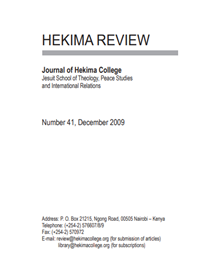
Hekima Review No. 41 (Dec 2009)
Fifteen years after the first Synod for Africa, the “Second Special Assembly of the Synod of Bishops for Africa” took place in Rome from 4 to 25 October 2009. This event of the Catholic Church in Africa, considered a “New Pentecost,” constituted the climax of a process that started earlier. It is the late Pope John Paul II who first announced it in November 2003. And in June 2005 Pope Benedict XVI convoked it. The theme of this Second Synod for Africa was “The Church in Africa in Service to Reconciliation, Justice and Peace.” Around two hundred bishops from Africa and Madagascar, together with twenty other bishops from other continents, priests, religious, and lay delegates constituted this special ecclesial assembly for Africa over three weeks in the Vatican.
-
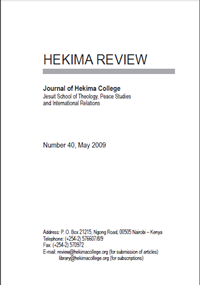
Hekima Review No. 40 (May 2009)
Famous in the Gospel of Luke is the so-called “Jesus manifesto,” in Lk 4:18-19. In this scene, we see Jesus in the temple of his home town Nazareth, on the Sabbath day, reading and applying to himself the following passage of the Prophet Isaiah (Is 61:1-2): “The spirit of the Lord is on me, for he has anointed me to bring the good news to the afflicted. He has sent me to proclaim liberty to captives, sight to the blind, to let the oppressed go free, to proclaim a year of favor from the Lord.” Announcing liberation and consolation for the poor, liberty for the captives and the oppressed, recovery of sight to the blind, Jesus proclaims also, at the end of this passage, “a year of favor from the Lord,” a Jubilee year!
-
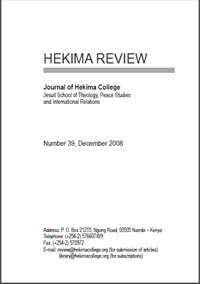
Hekima Review No. 39 (Dec 2008)
Many of us are familiar with Médecins Sans Frontières (Doctors Without Borders), a humanitarian organization created in 1971 by a small group of French doctors. Their conviction is that all people have the right to medical care regardless of their race, nationality, religious affiliation, or political persuasion. The needs of people, this organization holds, transcend national borders. Our increasingly global world is proving them right: the wind of economic recession is blowing across the whole world, leaving no region untouched; the election of Barak Obama to the presidency of the United States of America was a historical earthquake whose seismic waves were felt in every part of the globe. The erstwhile obscure Mama Sara Onyango (Obama’s paternal grandmother) of an equally obscure Kogelo village in Kenya’s Siaya District, has since rocketed to the status of a celebrity. An event transpiring thousands of miles away has transformed her life. Various television stations also beamed images of hordes of men and women from various parts of the world enthralled by joyful hope mediated by the landmark development in the United States.
-
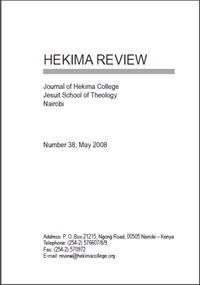
Hekima Review No. 38 (May 2008)
After a protracted post-election impasse, the clinching of the Annan-mediated political deal on 28th February 2008 brought to Kenya a desperately longed-for sigh of relief; however, the East African country was yet to be thrown into another political standoff a few days after the deal. The ensuing negotiations about cabinet positions revealed the painful fact that the political deadlock was not about the well-being of the ordinary man and woman on the streets of Nairobi or in the slums of Kibera and Mathare. A bloated cabinet has been announced, but the internally displaced people are yet to be resettled. One can also cite the political drama unfolding on the Zimbabwean electoral stage, to inductively show that democracy is not a magic formula that will solve all problems on the continent. It is one thing to embrace the rhetoric of democracy, and it is another thing altogether to internalize and implement its demands. Some issues need to be addressed if democracy is to work at all: ethnic conflicts, distribution of limited resources, and the concept of nationhood.
-
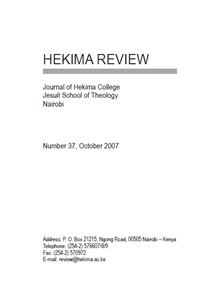
Hekima Review No. 37 (Oct 2007)
An old saying goes, ‘There is no place like home’. Home is a place of warmth, acceptance, love, belonging, confidence, identity, belonging, and now a place of knowledge. Luke presents Jesus coming to Nazara, a place where he had been brought up. Nazara becomes the place of identity and belonging for Jesus; yet it also becomes a place of rejection. On the one hand, Jesus being a native, is handed the treasure of his community from which to read. He reads from what the community identifies with. He does not read what he wants or what is foreign to the community but what is identical and valued by the prophets. From this, Jesus found his mission.
-
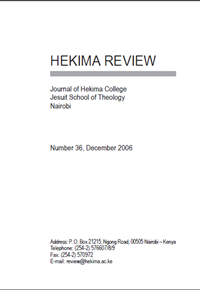
Hekima Review No. 36 (Dec 2006)
The Tower of Babel and the Salvation through Christ offer paradigms that help us revisit the challenges of the church in this time of globalization. The tower of Babel's story is the last great judgment that befell mankind in primeval times (Gen 11:1-9). It is not told to justify or explain the origins of linguistic, cultural, or racial diversity. In the chapters preceding the Babel story, there is a continuing dialectic of creation and fall, blessing and judgment, of God’s love and human rebellion. Given the diversity of Nations, where cultural and racial diversity are seen as part of a good creation, Babel represents a continuation of the fall, a first attempt at human imperialism, i.e. to build a civilization based on a unique language. In other
words, Babel is the culmination of the story of primeval rebellion against God, a cultural and civilizational project from which God is excluded, a project in which human cultural and political efforts seek to reach or replace God. -
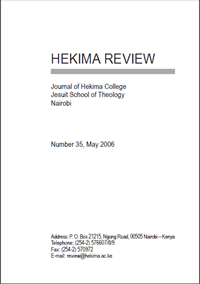
Hekima Review No. 35 (May 2006)
With the turn of the third millennium, Africa is experiencing a big growth of Christianity. This has led some scholars to affirm that the centre of Christianity has shifted to the southern continents of which
Africa is a part of. Some African countries celebrated a few years ago the centenary anniversary of evangelization. The celebrations were accompanied by an admiration of the speed with which African conversions to Christianity were made, and congratulations went to the missionaries for the large number of converts they achieved. But the admiration of such an enterprise was tempered by the fact that even though the number of converts increased at a high speed, the quality of life, that should accompany it, didn’t cease to decrease. -
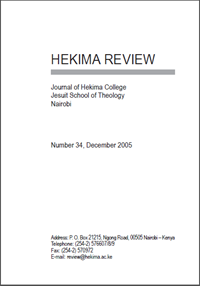
Hekima Review No. 34 (Dec 2005)
“Do not ask me where I speak from, who I am, and what audience I wish to help or harm. I am a human being like you, I shall die, and I was not born a functionary of the Truth nor a professional in the service of Christianity. I write in order to doff my masks before they blot out my face.”
-
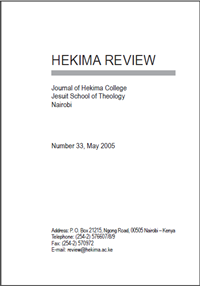
Hekima Review No. 33 (May 2005)
In his Apostolic Letter Mane nobiscum Domine, Pope John Paul II declared October 2004 - October 2005 the year of the Eucharist. This mystery has been celebrated and understood in different ways. Our celebration of the Eucharist today needs a new understanding to reconcile our spiritual hunger with the
material one, and to express, in a concrete way, our Christian faith. Thus, the celebration of the Eucharist should be life-oriented and context-sensitive. In other words, our celebration should find an echo in people’s lives. We cannot fully celebrate this mystery of our Christian faith while there are many people, mostly in third-world countries, who do not have access to adequate food. If our celebration does
not open our eyes and awaken our sensitivity to the needs of our sisters and brothers, then it becomes meaningless. -
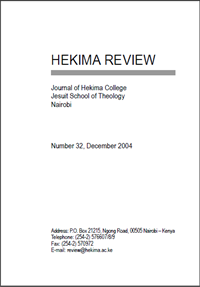
Hekima Review No. 32 (Dec 2004)
It was Basil Davidson who ironically saw Africa, and the effects of the white man’s quest to evangelize and civilize the Africans, as “The Black Man’s Burden”. A glance at the African continent from Cape to Cairo will easily reveal to any interested bystander that if contemporary Africa were any burden, which I suppose she is, she is not only primarily her burden but also the root cause of this burden. And, it makes a lot of sense to argue that, the Africans of our generation have lost the moral justification to point accusing fingers at anyone but themselves. Gone are the days when the blaming of the slavemasters, the colonialists, and the neocolonialists made some sense. By and large, whether we like to accept it or not,
today, we are the architects of our fortune or misfortune. And, the moment we started shouldering this odious responsibility ourselves, the better for everyone.

